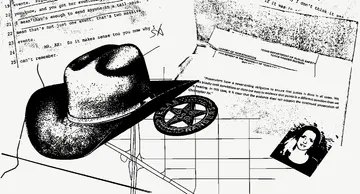Arthur Longworth is a 50-year-old inmate at Monroe Correctional Complex in Monroe, Washington. He is serving life in prison without the possibility of parole for an aggravated murder he committed when he was 20.
In this prison, the yard is only an acre and a half. But we pack into it hundreds at a time. Like every other place in here, it smells and sounds like people.
Outside prison, mass incarceration is measured in numbers, which is understandable, because the numbers are staggering. But after more than 30 years in prison – my entire adult life – I have mass incarceration sewn into my flesh and bones. I can’t turn away from it or choose not to know it, and it leaves me with little or no capacity for hope. It buries me. It keeps me from breathing.
When I close my eyes, certain faces of mass incarceration appear, unbidden, in my consciousness:
Boo’s is wide and moon-shaped. He is the little Native American kid who wouldn’t let go of my leg at my sister’s foster home. He’s called me uncle ever since. If I open my eyes, I’ll see him as clearly as I did when we were boys, because he’s on this yard with me. At least a lifetime ago, he shot someone during a drug deal. He has life without the possibility of parole.
Dean’s face is brighter and buoys me. He is the boy I met in a receiving home in Tacoma, Washington when he was nine and I was 12. Both of us, at that point, were already veterans of an interminable number of state placements. Dean was in the control unit in Walla Walla with me when guards firehosed me every week and kept me naked and in leg shackles for months. He lifted my spirit by giving me a thumbs-up through the narrow window slat of his cell door whenever the guards dragged me by. Dean is on the yard of a prison 60 miles south of here. Two decades ago, he struck out under this state’s three-strikes law — for burglary. He has life without the possibility of parole.
I shared a room with Robert at the boys’ home in Silverdale, Washington the night he snuck out the window. He said he’d be back by morning, but he wasn’t. He was in an article in the next day’s newspaper because he beat up and robbed a man outside a tavern. I wasn’t surprised to learn that the man died a week later: Robert was bigger than all of us and always unaware of his strength. He is at a place 400 miles east. He has life in prison.
Dan’s face is haggard; he looks old, though he’s only a few years older than me. I first saw him when I was at a boys’ home outside Centralia in Washington. I never expected that he’d come to prison because he was the son of a staff member. Prison, I believed, was for those who were raised by the state. Maybe whatever was wrong inside of us rubbed off onto him. Dan hasn’t been to the yard since his friend, Dennis, died in the cell next to him. Maybe he’s given up. He has life without the possibility of parole.
I haven’t known James’s face long, but I know where he came from, and it troubles me deeply. Like me, he was at O.K. Boys Ranch, and he committed almost the same crime I did. But he’s 20 years younger, and has more of this ahead of him. He too has life without the possibility of parole.
And then there’s Tony, whose face, I hope, no longer shows the strain of his unending incarceration. He got let go from his job at the license plate factory after he lost part of his hand in the metal-cutting machine. He often talked to us about the state boys’ ranch in Eastern Washington, where he grew up. He ran laps in the yard, taught us math, did the best he could. For 25 years. And I swear I still hear his voice in the corridor when it’s crowded, even though I know it can’t be him because he hung himself in his cell.
He had life without the possibility of parole.
They, we, are mass incarceration. We grew up inside of it, never outside of it. Our lives as boys — free of education, free of a home, free of hope — pulled us into becoming the numbers. And now we are in here forever, without the chance of parole.
But those aren’t the only faces I see. There’s one more that I think of every day, the face of a person I keep close in order to never forget why I wasn’t delivered into this innocent or blameless. As a boy, I stabbed and killed a person. I’m bound irrevocably to that terrible act, and obligated to the human being I committed it against, in a way that feels separate from my punishment. No matter how bad it gets in here, prison doesn’t feel like it makes up for anything.
But prison, even in the form it has devolved into, has still taught me something: no amount of pain or misery the system assigns can undo the crime I committed or make me any sorrier than I was the moment I committed it.
My remorse can be the seed of my change. Although I cannot undo my crime, I can do good. I can care about others. I can see them.
A previous version of this article misstated Longworth's age at the time of his crime.
